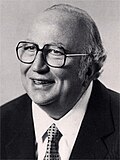Main chronology
The legislature saw the birth of a new political coalition that would have characterized the Italian politics during the 1980s. The so-called Pentapartito began in 1981 at a meeting of the Congress of the Italian Socialist Party (PSI), when the christian democrat Arnaldo Forlani and socialist Bettino Craxi signed an agreement with the "blessing" of Giulio Andreotti. As the agreement was signed in a trailer, it was called the "pact of the camper." The pact was soon defined "CAF" for the initials of the signers: Craxi–Andreotti–Forlani. With this agreement, the DC recognized the equal dignity of the so-called "secular parties" of the majority (i.e., the Socialists, Social Democrats, Liberals and Republicans) and also guaranteed an alternation of government with them. In June 1981 republican Giovanni Spadolini became the first non-christian democrat to sworn in as Prime Minister of Italy.
With the birth of the Pentapartito, the possibility of the growth of the majority toward the Italian Communist Party (PCI) was finally dismissed.
During this legislature, the list of who belonged to the secret lodge P2 was published. The P2 was a Masonic lodge founded in 1945 that, by the time its Masonic charter was withdrawn in 1976, had transformed into a clandestine, pseudo-Masonic, ultraright [3] [4] [5] organization operating in contravention of Article 18 of the Constitution of Italy that banned secret associations. In its latter period, during which the lodge was headed by Licio Gelli, P2 was implicated in numerous Italian crimes and mysteries, including the collapse of the Vatican-affiliated Banco Ambrosiano, the murders of journalist Mino Pecorelli and banker Roberto Calvi, and corruption cases within the nationwide bribe scandal Tangentopoli. P2 came to light through the investigations into the collapse of Michele Sindona's financial empire. [6]
P2 was sometimes referred to as a "state within a state" [7] or a "shadow government". [8] The lodge had among its members prominent journalists, Members of Parliament, industrialists, and military leaders—including Silvio Berlusconi, who later became Prime Minister of Italy; the Savoy pretender to the Italian throne Victor Emmanuel; [9] and the heads of all three Italian intelligence services (at the time SISDE, SISMI and CESIS).
When searching Licio Gelli's villa in 1982, the police found a document called the "Plan for Democratic Rebirth", which called for a consolidation of the media, suppression of trade unions, and the rewriting of the Italian Constitution. [10]
The scandal subsequent the discovery of the members of the lodge brought to a deep crisis between the main political parties which were part of the government and ended with the official dissolution of the lodge with the Law 25 January 1982, n. 17.
This page is based on this
Wikipedia article Text is available under the
CC BY-SA 4.0 license; additional terms may apply.
Images, videos and audio are available under their respective licenses.









